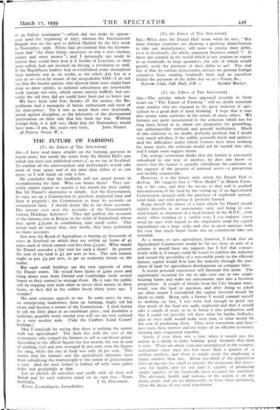THE FUTURE OF FARMING [To the Editor of THE SPECTATOR]
SIR,—I have read many articles on the farming question in recent years, but surely the series from Sir Daniel Hall's pen which you have just published cowes a', as we say in Scotland. To combat all his extravagances and irrelevancies would take more of your space and of my time than either of us can spare, so I will touch on only a few.
He concludes that the landlords will not spend money in reconditioning the land. Who can blame them? They cer- tainly cannot expect to receive a fair return for their outlay. But Sir Daniel's alternative is simple. Let the Government, he says, set up a Commission to purchase neglected land and farm it properly ; the Commission to keep its accounts on commercial lines. I should dearly like to see those accounts. Has anyone ever seen the accounts of the Government's various Holdings Schemes? They did publish the accounts of the famous case at Borgue in the wilds of Sutherland, where they spent £35,000 in establishing nine small crofts. This raised such an outcry that, very wisely, they have published no more accounts.
Just now the Board of Agriculture is buying up thousands of acres in Scotland on which they are setting up farms of 4o acres, each of which cannot cost less than L2,500. What would Sir Daniel .consider a fair rent for such a farm? At present the rent of the land is Li per acre or less. The new tenants ought to pay £4 per acre, to get an economic return on the outlay.
But - such small holdings are the very opposite of what Sir Daniel wants. He would have farms of 4,000 acres and bring down men from Oxford and Cambridge (with several letters to their names) to manage them. He is sure the public will be tripping over each other to invest their money in these farms, as they did in the rubber boom thirty years ago. I wonder!
His next sentence appeals to me. In some cases, he says, an enterprising landowner, keen on farming, might sell his estate and become a tenant of the Commission. I shall hasten to sell my little place at an exorbitant price ; and doubtless a judicious grumble every second year will see my rent reduced to a very modest sum. (Vide the Crofters Land Courts' findings.) May I conclude by saying that there is nothing the matter with our agriculture? The fault lies with the rest of the community who compel the farmers to sell at cut-throat prices. According to the official figures for last month, the rise in cost of clothing, fuel and rent averaged 81 per cent. over the figures for 1914, while the rise in food was only 38 per cent. This means that the farmers and the agricultural labourers have been subsidising the townspeople to the extent of £13o,000,000 a year. And the poor farmer is fobbed off with some paltry doles and grudgingly at that.
Let us abolish all subsidies and tariffs with all their evil brood and let each industry stand on its own feet.—Yours
faithfully, J. G. GLI-CHRIST. Kerse, Lesmahagow, Lanarkshire.










































 Previous page
Previous page